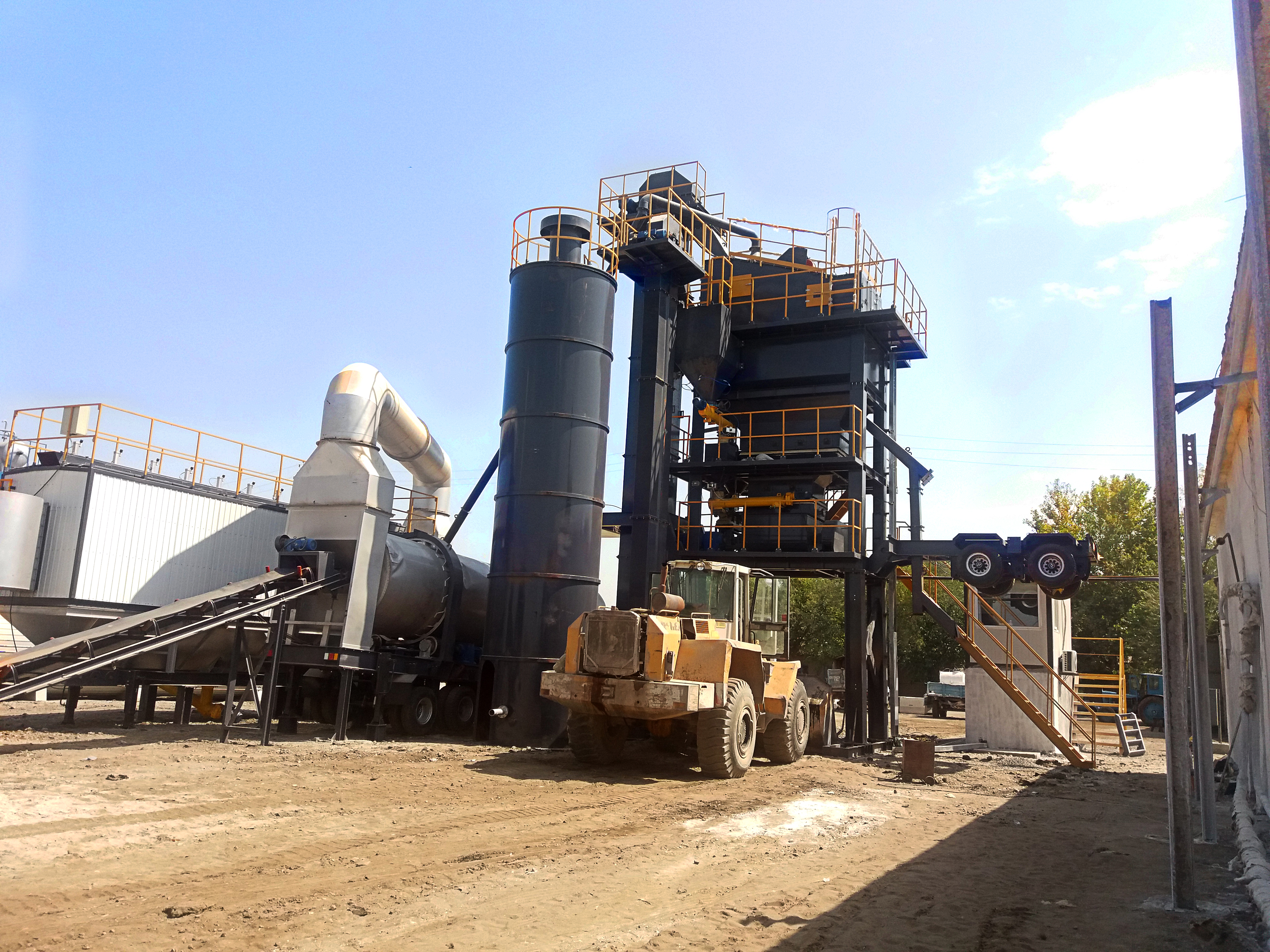What Are the Basic Parameters of a Mobile Asphalt Plant?
A mobile asphalt plant is a crucial piece of equipment in road construction, offering the flexibility to produce asphalt mix directly at the job site. Unlike stationary plants, mobile versions can be relocated quickly, reducing transportation costs and ensuring a steady supply of hot mix asphalt. This makes them ideal for projects in remote locations, temporary roadworks, or highway repairs.
Understanding the basic parameters of a mobile asphalt plant is essential for selecting the right equipment for your project. Factors such as capacity, mixing type, fuel consumption, and mobility features influence overall efficiency and cost-effectiveness. In this article, we will explore the key specifications that define a mobile asphalt plant and how they impact performance.
Contents |
[edit] Key Parameters of a Mobile Asphalt Plant
[edit] 1. Production Capacity
One of the most important parameters of a mobile asphalt plant is its production capacity, typically measured in tons per hour (TPH). The capacity determines how much asphalt mix the plant can produce within a given time, directly affecting project timelines and efficiency.
- Small mobile plants: 10-40 TPH (ideal for minor repairs and rural roads).
- Medium mobile plants: 40-100 TPH (suitable for urban roads and medium-sized projects).
- Large mobile plants: 100+ TPH (best for highways and large-scale infrastructure projects).
Selecting the right capacity depends on the project size, daily asphalt demand, and transportation logistics.
[edit] 2. Mixing Type: Batch vs. Continuous Asphalt Plant
Mobile asphalt plants generally come in two types based on their mixing process:
- Batch mixing plants: Produce asphalt in separate batches, allowing precise control over mix composition. Suitable for projects requiring different asphalt grades.
- Continuous asphalt plants: Operate non-stop, providing a steady output of asphalt mix. Ideal for high-volume projects that require a consistent mix design.
A continuous asphalt plant is often preferred for large-scale road construction due to its efficiency and reduced operational costs.
[edit] 3. Drying and Heating System
Efficient drying and heating of aggregates are critical to achieving high-quality asphalt mix. The drying drum in a mobile asphalt plant is designed to remove moisture and heat the raw materials to the required temperature.
Key factors include:
- Burner type: Diesel, heavy oil, natural gas, or coal-fired burners affect fuel efficiency.
- Drum insulation: Helps maintain heat and reduces fuel consumption.
- Temperature control: Ensures consistent asphalt quality.
[edit] 4. Aggregate and Filler Storage
Aggregate storage capacity influences production efficiency. A mobile asphalt plant is equipped with multiple bins for storing different aggregate sizes. The number and size of bins vary depending on the plant’s capacity.
- Larger storage bins allow continuous operation without frequent refilling.
- Proper dust and filler storage enhance mix quality and environmental compliance.
[edit] 5. Asphalt Mixer and Bitumen System
The mixer is responsible for blending aggregates, bitumen, and fillers to create the final asphalt mix. It should have:
- High-speed, efficient mixing blades for uniform composition.
- A reliable bitumen pump and storage tank to ensure consistent supply.
- Automatic weighing systems for precise ingredient measurements.
The efficiency of the bitumen heating system affects the final mix’s stability and performance on roads.
[edit] Additional Parameters That Influence Performance
[edit] 1. Mobility and Transportation Features
Since the primary advantage of a mobile asphalt plant is its portability, mobility features play a crucial role in site relocation efficiency. These include:
- Trailer-mounted or modular design for easy transport.
- Fast assembly and disassembly to reduce downtime.
- Compact footprint to fit into restricted job sites.
[edit] 2. Control System and Automation
Modern mobile asphalt plants come with advanced control systems for enhanced operational efficiency. Key features include:
- PLC-based automation for precise process control.
- User-friendly interface for easy monitoring and adjustments.
- Real-time data tracking to optimise production efficiency.
[edit] 3. Environmental Considerations
Environmental compliance is critical in asphalt production. Mobile plants are equipped with:
- Dust collection systems to minimise emissions.
- Energy-efficient burners to reduce fuel consumption.
- Noise reduction technology for urban-friendly operation.
[edit] Related articles on Designing Buildings
- A Short Overview Of An Asphalt Batching Plant Workflow
- A Summary of Concrete Plants: Advantages, Applications, and Types
- Adapting To Site Conditions And Improving Efficiency In Complex Latin American Terrain
- Asphalt.
- Asphalt mixing plant types and considerations
- Binder course.
- Bituminous mixing and laying plant.
- Can a Mobile Asphalt Plant Mix While Moving?
- Carbon Neutrality and Circular Economy Drive Transformation of Mining Equipment in Latin America.
- Case Studies of Peru and Colombia: The Impact of Policies on Crushing Station Procurement
- Component parts of a mobile concrete plant
- Concrete batching plants
- Concrete batching plants; technical requirements for large-scale infrastructure projects
- Concrete boom pumps
- Concrete Pump Selection and Efficiency Improvement Strategies in Latin American High-Rise Building Construction
- Detailed Explanation of Pre-Installation Preparations for Aggregate Crushing Plants
- Does a Ready-Mix Concrete Plant Need to Use a Water Heater?
- Does the Installation of a Mobile Concrete Plant Require a Foundation?
- Fixed VS Mobile Asphalt Plants: Which is More Suitable for Project Contractors?
- Global Brands in Latin America and the Market Share of Asphalt Plant Manufacturers
- Groundwater control in urban areas.
- Highway drainage.
- How Chilean Projects Achieve Green And Intelligent Production With Concrete Batching Plants
- How Peruvian Crushing Plants Can Achieve High Capacity And Low Energy Use
- How to Configure Aggregate Production Lines to Achieve Maximum Benefits
- How to Reduce the Energy Consumption of Drum Asphalt Plants?
- Infrastructure.
- Investing in a Portable Concrete Plant
- Is a Self-Loading Concrete Mixer Suitable for Rugged Environments?
- Mastic Asphalt Council.
- Mastic asphalt flooring.
- Mobile asphalt stations.
- Multi-Point Mobile Stone Crushers Under Dispersed Raw Material Distribution
- Overview of the road development process.
- Potential environmental and circular economic value of concrete pumps
- Ready-Mix Vs Conventional Batching Plants: Intelligent Control Differences
- Road construction.
- Road joints.
- Runway construction.
- Self-loading concrete mixers
- Self-loading concrete mixer training and team management
- Small Concrete Plants vs Large Plants: Which One is More Suitable for Your Project Needs?
- Social Responsibility and Sustainability in Stone Crushing Plants in Latin America
- Technical Engineer's Perspective: Performance of Concrete Trailer Pumps in High-Rise Buildings
- The Impact of the Accuracy of the Weighing System on Asphalt Plants
- Top Rated Concrete Mixer Truck Parts In Your Town
- Tracked Mobile Aggregate Crusher Plant with Oil Electric Dual-use
- Types of road and street
- What Are the Basic Parameters of a Mobile Asphalt Plant?
- What Are The Hidden Advantages Of A Mobile Asphalt Plant That Can Be Remotely Monitored?
- Why Is the Concrete Trailer Pump Powerful?
- What to Look for in a Concrete Batching Plant
Featured articles and news
Building Safety recap January, 2026
What we missed at the end of last year, and at the start of this...
National Apprenticeship Week 2026, 9-15 Feb
Shining a light on the positive impacts for businesses, their apprentices and the wider economy alike.
Applications and benefits of acoustic flooring
From commercial to retail.
From solid to sprung and ribbed to raised.
Strengthening industry collaboration in Hong Kong
Hong Kong Institute of Construction and The Chartered Institute of Building sign Memorandum of Understanding.
A detailed description fron the experts at Cornish Lime.
IHBC planning for growth with corporate plan development
Grow with the Institute by volunteering and CP25 consultation.
Connecting ambition and action for designers and specifiers.
Electrical skills gap deepens as apprenticeship starts fall despite surging demand says ECA.
Built environment bodies deepen joint action on EDI
B.E.Inclusive initiative agree next phase of joint equity, diversity and inclusion (EDI) action plan.
Recognising culture as key to sustainable economic growth
Creative UK Provocation paper: Culture as Growth Infrastructure.
Futurebuild and UK Construction Week London Unite
Creating the UK’s Built Environment Super Event and over 25 other key partnerships.
Welsh and Scottish 2026 elections
Manifestos for the built environment for upcoming same May day elections.
Advancing BIM education with a competency framework
“We don’t need people who can just draw in 3D. We need people who can think in data.”
Guidance notes to prepare for April ERA changes
From the Electrical Contractors' Association Employee Relations team.
Significant changes to be seen from the new ERA in 2026 and 2027, starting on 6 April 2026.
First aid in the modern workplace with St John Ambulance.
Solar panels, pitched roofs and risk of fire spread
60% increase in solar panel fires prompts tests and installation warnings.
Modernising heat networks with Heat interface unit
Why HIUs hold the key to efficiency upgrades.


























